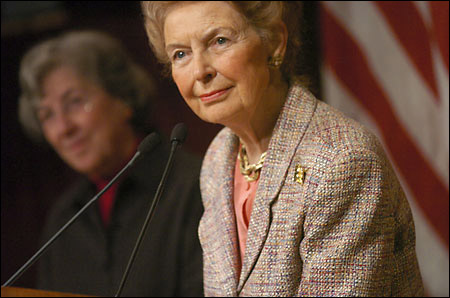Conservative icon speaks at K School
Schlafly says activist judges are new conservative target

Calling the U.S. Supreme Court “the most powerful branch of government,” conservative activist Phyllis Schlafly said that grassroots conservatives who have focused on family and social issues are setting their sights next on reforming America’s “imperial judiciary.”
Schlafly, a leader of the conservative movement, founder of the pro-family Eagle Forum, and prominent opponent of the Equal Rights Amendment, said that it is wrong for courts to legislate from the bench, offering examples such as recent rulings against reciting the Pledge of Allegiance in schools, displaying the Ten Commandments in government buildings, and requiring government to increase funding for public schools.
“You don’t have to be a lawyer to know something is askew with our system,” Schlafly said.
Schlafly spoke Friday afternoon (Oct. 14) at the John F. Kennedy School of Government’s John F. Kennedy Jr. Forum. Her talk, “The Rise of Grassroots Conservatism,” kicked off “Right Here, Right Now,” a conference organized by the Harvard Conservative Women’s Caucus.
Conference chairperson Jennifer Raymond, a senior at Harvard College, said Schlafly’s accomplishments helped inspire the conference. Raymond said that conservatism is on the rise among the young, and the conference aims to dispel the notion that all college women are liberal.
“It is our hope that there should be little doubt about two things: that not all college women are liberal and that conservatives care deeply [about many things],” Raymond said.
Schlafly’s conservative roots run deep. In her talk, she offered a history of what she called the “grassroots conservative movement,” saying fear of communism and communist infiltration into American government and society was the movement’s main driving force in the 1950s and 1960s. It was a time, she said, when “the whole socialist onslaught was thought to be the wave of the future” and when American presidential administrations believed that government offered the answer to society’s ills.
Schlafly said there was a widespread belief that communism would ultimately be victorious during that period and said that defeatist belief extended into the military and to government’s highest levels. Even President Richard Nixon’s Secretary of State Henry Kissinger believed the Soviet Union would ultimately win the Cold War, Schlafly said, and adjusted his policies accordingly.
“He believed that the Soviet Union would be the pre-eminent superpower and that his role was to negotiate the best deal possible with the Soviet Union [for the United States] as second best,” Schlafly said.
The social conservative movement was energized by the fight against feminism and the Equal Rights Amendment (ERA) in the 1970s, Schlafly said. Despite considerable support for the ERA in the president’s office, in Congress, in state legislatures, and in the media, Schlafly said the grassroots movement was able to block its passage in enough states to ensure its defeat. They did that, she said, by working hard and testifying in state legislatures. Schlafly said she testified in 41 states herself and said the amendment didn’t offer much for women because equal pay for equal work was already the law of the land. Further, she said, it would have made women eligible for the draft and would have broken down gender barriers in places like prisons and institutions such as the Boy and Girl Scouts.
“You couldn’t really sell it to young women that they had to register for the draft,” Schlafly said.
Schlafly refused to comment on the Iraq War, but didn’t let President Bush off the hook completely. His father, George H.W. Bush, lost the election to President Bill Clinton, Schlafly said, because Bush betrayed the conservative movement when he violated his “read my lips, no new taxes” pledge.
The current president, she said, has angered conservatives with his lack of fiscal discipline and with his two Supreme Court appointments so far. Schlafly said that neither John Roberts nor Harriet Miers appears to be the kind of justice who will stick to a strict interpretation of the U.S. Constitution.
“She’s 60 years old and has never written anything important,” Schlafly said of Miers. “I don’t buy this idea of just trusting the president. Millions of people voted for Bush solely because they believed he would change the direction of the court away from judicial activism. They feel betrayed. These two appointments don’t move us anywhere.”
Schlafly doubted that meaningful change to the judicial system will come from the Republican “elite,” saying they just accept the court’s word as the law of the land. It will take grassroots conservatives to pressure the national government for reforms that curb the power of the judiciary and prevent judges from forcing social action not supported by broader society.
“The grassroots movement is most concerned about the issue of judicial tyranny,” Schlafly said. “The majority of people believe that judges are out of control. They believe that if they [judges] rule against our values, they should be impeached.”




